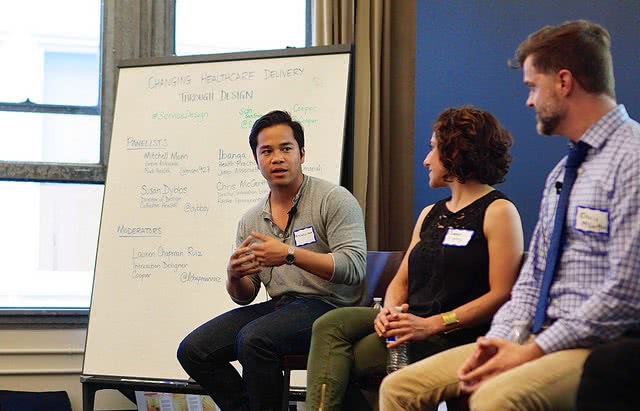
Flickr user Ted Eytan
Healthcare has long been one of the fastest-growing industries in the nation. This year, for the first time in history, the health sector has surpassed manufacturing and retail to become the largest source of jobs in the United States.
Naturally, this is a draw for many college-age students who are seeking to find lucrative employment after graduation, but many college students and recent graduates have no desire to practice medicine in a clinical environment. Luckily, there are a number of non-medical careers in the healthcare field that college students can pursue.
Epidemiology
For individuals who want to make an impact on public health in a major way, epidemiology might be an attractive career path. On a broad scale, epidemiologists work in the public health sector using statistical procedures, techniques, and methodologies to determine what causes disease and injury and help scientists and medical professionals come up with solutions to these epidemics.
Epidemiologists are in high demand in the United States, due in large part to the widespread fear of bioterror attacks. But diseases like zika, West Nile virus, swine flu, SARS, and a number of other new diseases have increased the demand as well.
Epidemiology is a great career path for those who are interested in research and making a drastic impact on public health but aren’t particularly attracted to the hands-on aspects of being a physician or healthcare practitioner. Instead, they work to study infectious diseases, chronic illnesses, birth defects, and occupational health in order to combat these conditions and diseases from the source.
Medical Social Work
Social work is a rewarding and rapidly growing career path in the United States. Opportunities in medical social work in particular are expected to grow, due to the current demands on the healthcare system.
In essence, medical social workers are responsible for working with patients and their families to ensure that they are prepared to cope with their illnesses, especially those that are chronic or terminal. Their positions can vary greatly. Many choose to work in public health, with geriatric patients, cancer patients, palliative care, or mental health.
This is, of course, no easy task, but those with a passion for mental health, patient advocacy, psychology, and the human condition will find it to be a gratifying career path.

Clinical Educator
Clinical educators are responsible for educating people on ways that they can best manage and prevent illnesses and disease. Their job is preventative care at it’s finest, as they help combat disease through teaching healthy habits and educating the public about nutrition, exercise, dispelling rumors about healthcare, and encouraging individuals to seek help as needed.
Typically, clinical educators work very closely with the public, distributing educational materials and visiting communities who are often on the margins or left out of the healthcare sector entirely. Clinical educators sometimes become patient advocates, returning to hospitals with field research and information that helps clinical staff to better meet the needs of the communities that they serve.
These positions are in demand in areas across the United States, especially in metropolitan areas.
Healthcare Administration
Healthcare administration is a field that is expected to grow by 20 percent by the year 2026, according to recent government projections. This makes it an attractive field for those who have a passion and background in business, management, and hope to make a difference in the field without actually practicing medicine.
Administrators and managers in these kinds of positions typically make close to $81,000-$100,000 per year on average and have earned a minimum of a bachelor’s degree in a business or healthcare-related field.
On a day-to-day basis, healthcare managers and administrators plan, direct, and coordinate medical health services. Some manage entire medical institutions, while others are in charge of a particular area of the hospital, such as the surgical wing, oncology, or obstetrics.
Regardless of their position, healthcare administrators work closely with staff, patients, and insurance agents to ensure that patients are getting the highest quality of care, that services are efficient and making sure that the hospital is meeting the bottom line.
Healthcare Design
For those with a creative flair, a desire to solve problems in unconventional ways, and who have a background in design or technology, the medical field is rife with opportunities for designers.
In many cases, these designers work to improve the patient experience in hospitals, bringing a fresh artistic perspective that you might not find in most medical staff. Those who work in healthcare design are responsible for creating an experience that puts the patient at ease, from being able to book appointments online, to creating signage to help patients better navigate hospital buildings, to finding better ways for patients to reach their doctors.
Designers can also work outside of the hospital setting entirely. Many who are interested in design work are employed in tech startups that have the ability to create devices that will advance the field of medicine entirely. Others choose to work for agencies, non-profits, consulting, or full-time in a hospital setting.
Regardless of where designers work, those who are involved in the field of healthcare design have a passion for the patient, doctor, and overall user experience.
College graduates who are looking for a lucrative career path are smart to pursue positions in the healthcare field. Regardless of your clinical experience or desire to work in a clinical setting, healthcare is an industry that requires many different talents and perspectives, whether clinical in nature or otherwise. For creatives, scientists, and advocates alike, the healthcare sector has opportunities for all.





